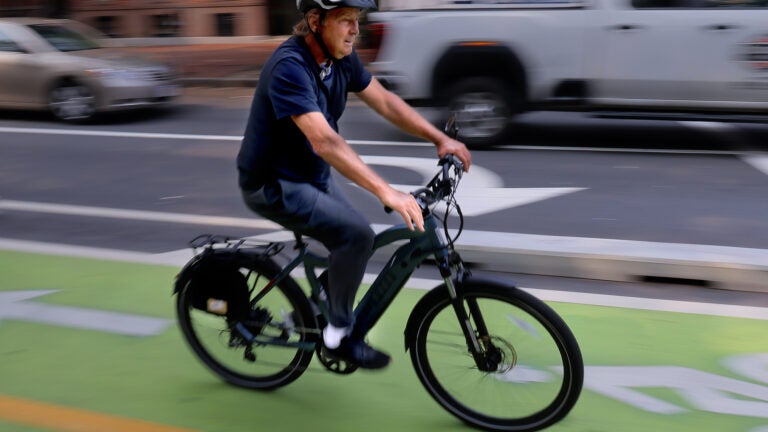Local News
After a crash on Cape Cod, a Brewster woman says Massachusetts needs tougher e-bike regulations. Should the state step in — or let riders decide?

A Brewster woman who was impaled in the eye by an e-bike is calling for stricter regulations.
On Sept. 10, Lynne Forester, 69, was walking on the Cape Cod Rail Trail around 10:30 a.m. near mile marker 5.6, like she has “been doing for 10 years,” when a bicyclist suddenly collided with her from behind, she told Boston.com in an interview.
The bicyclist was riding in a group and heard someone say ‘Oh, look at the water,’ referring to Long Pond. The bicyclist looked to her right at the water and collided with Forester. The bicyclist told police she didn’t see Forester before hitting her, according to a Harwich Police Department report.
Forester said the bicyclist’s brake handle went into her left eye. The Harwich Fire Department arrived at the scene to remove the handlebars from the bike, “leaving a small portion still attached to the victim,” the police report said.
Forester was transported to Cape Cod Regional Tech school before being MedFlighted to Mass. General Hospital. She said doctors told her family she had a 30% chance of dying in the operating room. Forester also said she suffered multiple face and skull fractures, as well as subarachnoid hemorrhages. She spent 24 days in the hospital and faces a long road to recovery, she told Boston.com.
“I’m now disabled. I have limited sight in my left eye,” she said.
Stricter e-bike regulations?
In Massachusetts, e-bikes are defined and regulated in two classes: Class 1 electric bicycles are pedal-assist bikes that provide power only when the rider is pedaling and can reach speeds up to 20 miles per hour. Class 2 e-bikes, which feature a throttle that allows riders to accelerate without pedaling, can reach speeds of up to 20 miles per hour.
You don’t need a license to ride an e-bike in Massachusetts, and both Class 1 and 2 bikes are allowed on roadways, in bike lanes, on bike paths, and paved trails – except where prohibited by local jurisdictions. They are not, however, allowed on sidewalks or on natural surface trails (unless allowed by local signage), and riders under 17 years of age must wear a helmet when using an e-bike.
E-bike use has surged in recent years, with Massachusetts launching a voucher program in the spring to encourage e-bike usage. Supporters point to their environmental benefits, accessibility for riders with physical limitations, and potential to help reduce traffic congestion.
But critics, like Forester, say more local enforcement of the existing regulations is needed to prevent accidents like hers from happening to others.
“I would like the police and towns to come up with some laws to enforce [the regulations.] I really think on the Rail Trail here in Cape Cod, [e-bikes] shouldn’t be on the trail in the summertime. There’s too many people on it, and more and more people are going to get hurt,” she told Boston.com.
Forester also said she’d like e-bikes to be treated like motorized vehicles, with users being required to be 18 years or older to operate a bike, to have a license to ride, and to have insurance.
When asked if she would press charges against the bicyclist who hit her, Forester said it is something she and her husband are considering.
“We’re talking about it just like you would if you were hit from behind [in your car] and you were injured. So most likely, we probably will … not to bankrupt her or anything like that, just to kind of get a settlement and maybe put the money towards regulating e-bikes.”
Should Mass. enforce stricter e-biker regulations?
Sign up for the Today newsletter
Get everything you need to know to start your day, delivered right to your inbox every morning.




